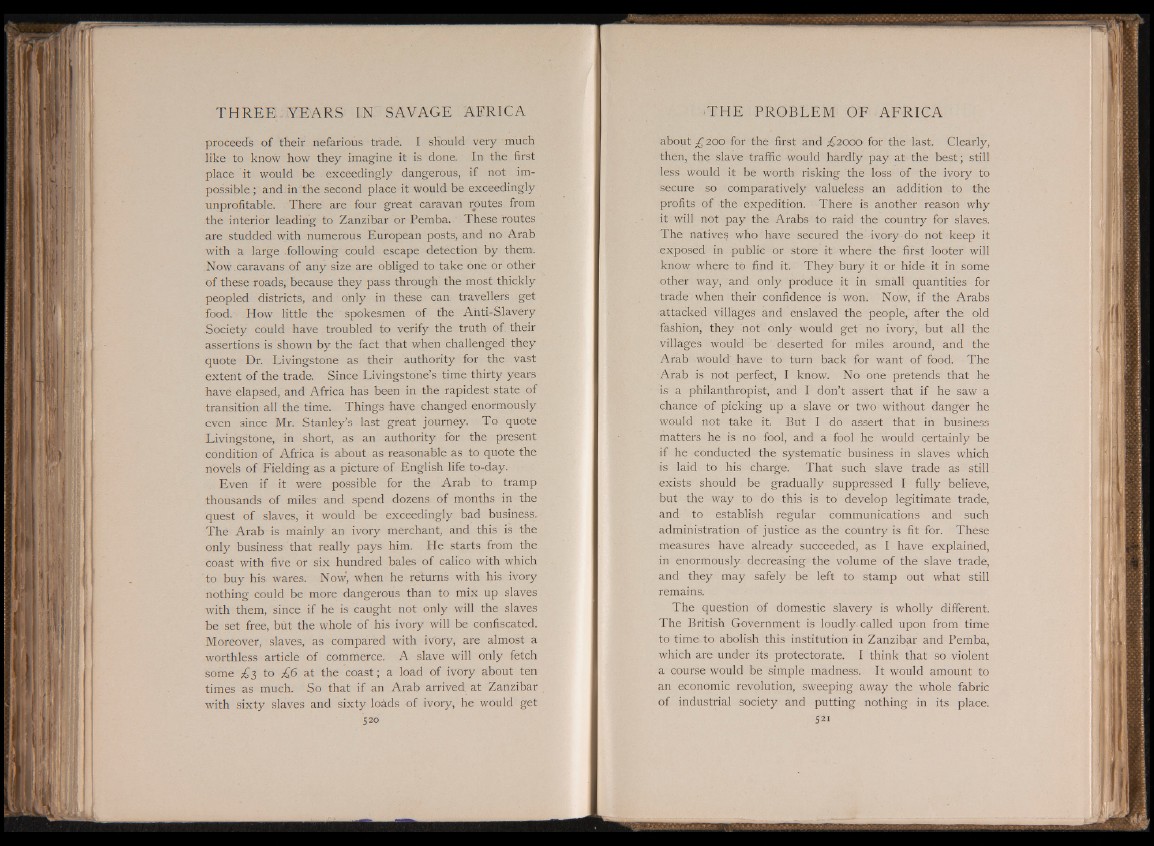
proceeds of their nefarious trade. I should very much
like to know how they imagine it is done. In the first
place it would be exceedingly dangerous, if not impossible;
and in the second place it would be exceedingly
unprofitable. There are four great caravan routes from
the interior leading to Zanzibar or Pemba. These routes
are studded with numerous European posts, and no Arab
with a large .following could escape detection by them.
Now caravans of any size are obliged to take one or other
of these roads, because they pass through the most thickly
peopled districts, and only in these can travellers get
food. How little the spokesmen of the Anti-Slavery
Society could have troubled to verify the truth of their
assertions is shown by the fact that when challenged they
quote Dr. Livingstone as their authority for the vast
extent of the trade. Since Livingstone’s time thirty years
have elapsed, and Africa has been in the rapidest state of
transition all the time. Things have changed enormously
even since Mr. Stanley’s last great journey. To quote
Livingstone, in short, as an authority for the present
condition of Africa is about as reasonable as to quote the
novels of Fielding as a picture of English life to-day.
Even if it were possible for the Arab to tramp
thousands of miles and spend dozens of months in the
quest of slaves, it would be exceedingly bad business.
The Arab is mainly an ivory merchant, and this is the
only business that really pays him. He starts from the
coast with five or six hundred bales of calico with which
to buy his wares. Now', when he returns with his ivory
nothing could be more dangerous than to mix up slaves
with them, since if he is caught not only will the slaves
be set free, but the whole of his ivory will be confiscated.
Moreover, slaves, as compared with ivory, are almost a
worthless article of commerce. A slave will only fetch
some £ 3 to £6 at the coast; a load of ivory about ten
times as much. So that if an Arab arrived at Zanzibar
with sixty slaves and sixty lorids of ivory, he would get
520
about £ 200 for the first and £2000 for the last. Clearly,
then, the slave traffic-would hardly pay at-the best; still
less would it be worth risking the loss of the ivory to
secure so comparatively valueless an addition to the
profits of the expedition. There is another reason why
it will not pay the Arabs to raid the country for slaves.
The natives who have secured the ivory-do not keep it
-exposed in public or store it where the first looter will
know where to find it. They bury it or hide it in some
other way, and only produce it in small quantities for
trade when their confidence is won. Now, if the Arabs
attacked villages and enslaved the people, after the old
fashion, they not only would get'no ivory, but all the
villages would be deserted for miles around, and the
Arab would have to turn back for want of food. The
-Arab is not perfect, I know. No one pretends that he
is a philanthropist, and I don’t assert that if he saw a
chance of picking up a slave or two without danger he
would not take it. But I do assert that in business
matters he is no fool, and a fool he would certainly be
if he conducted the systematic business in slaves which
is laid to his charge. That such slave trade as still
exists should be gradually suppressed I fully believe,
but the way to do this is to develop legitimate trade,
and to establish regular communications and such
administration of justice as the country is fit for. These
measures have already succeeded, as I have explained,
in enormously decreasing the volume of the slave trade,
and they may safely be left to stamp out what still
remains.
The question of domestic slavery is wholly different.
The British Government is loudly called upon from time
to time to abolish this institution in Zanzibar and Pemba,
which are under its protectorate. I think that so violent
a course would be simple madness. It would amount to
an economic revolution, sweeping away the whole fabric
of industrial society and putting nothing in its place.
521